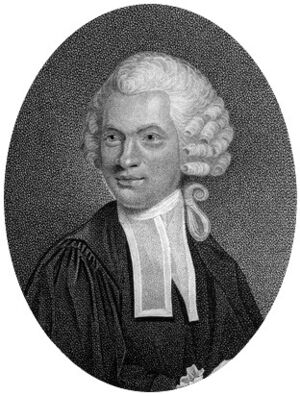Capel Lofft facts for kids
Capel Lofft (sometimes spelled Capell; born November 14, 1751 – died May 26, 1824) was a British lawyer, writer, and a keen amateur astronomer. He was known for his strong beliefs in fairness and his efforts to help others.
Contents
Capel Lofft's Life Story
Capel Lofft was born in London. He went to Eton College and then to Peterhouse, Cambridge for his education. He studied law at Lincoln's Inn and became a qualified lawyer, known as a barrister, in 1775. Besides his legal work, he wrote many books and articles about law and politics. He believed in making changes to the government and supported the Foxite Whig group. He also wrote many letters to famous writers of his time.
A Challenging Legal Case
Capel Lofft's career as a lawyer ended because of a difficult case in Stanton, Suffolk. In 1799, a young woman named Sarah Lloyd faced serious trouble. Capel Lofft worked very hard to help her and prevent a harsh punishment. He even stayed by her side, holding an umbrella to shield her from the rain, until the very end. The authorities did not like his strong efforts to help her. Because of this, he was removed from the list of qualified lawyers.
Supporting Other Writers
Capel Lofft was a big supporter of other writers. He wrote the introduction for a poem by Thomas 'Clio' Rickman about the freedom of people in Saint Domingo (now Haiti). Lofft praised Toussaint Louverture, a leader in Haiti, and hoped the newly free nation would do well.
He also helped Robert Bloomfield, who wrote a famous poem called The Farmer's Boy, get his work published. The famous poet Lord Byron made a joke about Lofft, calling him a "Maecenas" (a patron of the arts) for shoemakers and a helper for poets who needed their work published.
His Love for Astronomy
Capel Lofft was very interested in astronomy, which is the study of stars and planets. He often watched important events in the sky. He observed several transits, which are when one celestial body passes in front of another. He also watched eclipses, when one body blocks the light from another. Some of the events he saw included:
- Transits of Mercury in 1799 and 1802.
- Solar eclipses in 1806 and 1816.
- Lunar eclipses in 1797 and 1816.
Later Life and Beliefs
In 1811, Capel Lofft inherited a large property and family estate after his father and uncle passed away. He was a supporter of Napoleon, a famous French leader. When Napoleon was sent away to St Helena, Lofft wrote letters to a newspaper, the Morning Chronicle, saying he disagreed with the government's decision. He even tried to use a legal document called a habeas corpus to challenge Napoleon's imprisonment while Napoleon was on a ship in Plymouth.
In 1816, Lofft moved to Europe so his daughters could get a good education. He passed away in 1824 at the age of 72 in Montcalieri, near Turin. After his death, his collection of law books and other writings was sold at an auction in London.
Capel Lofft's Family
Capel Lofft married Anne Emlyn in 1778. Their fourth son, Capell Lofft the younger (1806–1873), also became a writer.
 | Chris Smalls |
 | Fred Hampton |
 | Ralph Abernathy |


